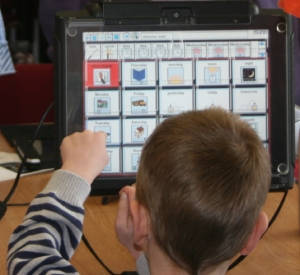
CALL Scotland provides a Pupil Assessment and Support service for individual children and young people in Scotland with additional support needs who require assistive technology and/or augmentative communication.
We also provide consultancy for schools and ERB provisions. This may be more suitable for you than referring several individual pupils.
How to refer a pupil
Referrals are made by head or deputy head teachers, local authority managers or educational psychology.
If you are working in a local authority which has a Service Level (or 'Partnership') Agreement with CALL (the current list of authorities), contact us to find out who in your authority is responsible for processing referrals to CALL. Partnership agreements enable us to provide joint planning and prioritisation on an authority-wide basis, 'booking' of blocks of CALL time, assessment and support for more than one child from the authority, more detailed reports, follow-up work, repeat visits, extended equipment loans, and staff development and training.
If a local authority does not have a service level agreement, assessment and support are charged on a per-case/per-day basis (or ideally, a service level agreement may then be agreed). Contact us to discuss the pupil(s) and to obtain a referral form.
A face-to-face assessment in school is not always necessary: staff can phone or email at any time to ask for advice from the CALL team about a particular learner or specific technology or strategies. This is a free service open to anyone in Scotland, funded by CALL's grant from the Scottish Government Learning Directorate.
CALL Assessment and Support leaflet for parents
CALL Assessment and Support leaflet for schools
Pupils
CALL's pupil assessment and support service is for young people with complex additional support needs including motor or speech impairment, language /communication difficulties, difficulties accessing the curriculum, especially reading and writing; complex combinations of needs arising from physical or learning disabilities, neurological conditions, specific learning difficulties, or visual or auditory impairments. CALL does not usually accept referrals of children with sensory impairments only, or with emotional and behavioural issues only.
What does it involve
CALL's assessment approach is holistic, and we use Joy Zabala's SETT framework to explore the:
- Student's strengths and needs;
- Environment - physical, digital and support in place;
- Tasks - what are the student's learning activities and tasks;
- Technology - what is available in school, and what assistive technology tools, resources and strategies might benefit the student's learning?
CALL assessment and support is a process, not a one-off event. It involves the 'team around the child' and aims to suggest tools and strategies and to highlight the role of the school staff and others, such as therapists and families, in supporting effective implementation.
In practice, the process usually involves the following:
- The referrer completes our standard form in conjunction with the team around the child. We also ask for copies of relevant reports from teaching and/or health professionals, such as speech and language or occupational therapists; samples of the student's work; and photos of videos.
- The CALL team discuss the referral and identifies a member of the CALL team to take a lead for the pupil.
- The CALL lead contacts the team around the child and parents and begins the SETT Scaffold for data gathering.
- A date is agreed for a visit to school to meet the pupil and team.
- On the visit, the CALL team will usually observe the pupil in class, meet with the team, and evaluate some technologies and strategies with the pupil and the team. We welcome parents to join a discussion following the assessment session.
- If suitable tools and strategies are identified, we usually lend equipment for evaluation for three months. We usually provide a written report and other resources to support staff and pupils.
- We may also offer a follow-up visit or training for staff where necessary. Staff and parents are free to contact us at any time to discuss the technology and strategies.
- We ask the team and the pupil (where appropriate) to complete an evaluation, and if this is positive, we can provide a recommendation for provision of the technologies, resources and strategies.
School Consultancy
Sometimes staff in a school or ERB provision wish to obtain advice for several pupils or the whole school/provision. This can include an audit of the school's assistive technology and AAC provision and tailored consultancy and professional learning for staff. It usually involves:
- Initial discussion between senior management and CALL team and completion of an audit of assistive technology and/or AAC provision.
- Visit(s) by two of the CALL specialist team to meet staff and pupils in class and discuss and evaluate assistive technology and/or AAC tools for and with the learners.
- In-person and/or online professional learning for staff.
CALL School Consultancy leaflet


Our social media sites - YouTube, Twitter and Facebook